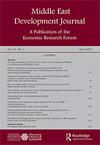Public debt and fiscal sustainability: the cyclically adjusted balance in the case of Lebanon
IF 0.9
Q4 DEVELOPMENT STUDIES
引用次数: 1
Abstract
ABSTRACT Lebanon’s high debt-to-GDP ratio and persistent overall budget deficit expose the entire financial system to vulnerability. Unless the country generates enough revenue to meet its gross financing needs, the prospect of borrowing more remains strong. Given the complexity of the Lebanese economy and debt structure, the formulation of fiscal and monetary policy is difficult and costly. Hence, policymakers are continuously confronted with difficult choices and must select the choice that is the least destructive. The choice between short-term economic stability and medium-term fiscal sustainability is a clear example of the dilemmas that confront policymakers. In addition, procyclicality and its repercussions on economic growth and the lack of responses to fiscal needs are matters of significant importance for public debt and fiscal sustainability. Hence, this study provides an in-depth analysis of the difficulties facing the Lebanese economy as it tries to sustain its public debt and the overall fiscal deficit. The study calculates the cyclically adjusted balance to analyze the appropriateness of fiscal policy and to assess the role of the automatic stabilizers. Additionally, the study employs a multivariate vector autoregression to forecast the variables in the simple debt model and to identify the impulses needed from various endogenous shocks. The derived results demonstrate that fiscal policy is predominately procyclical, that policymakers risked short-term economic stability for the sake of medium-term fiscal sustainability, and that unless the government adjusts its fiscal behavior, triggers automatic stabilizers, and negotiates a better deal with resident lenders, the economy will further deteriorate.公共债务和财政可持续性:黎巴嫩的周期性调整平衡
摘要黎巴嫩的高债务与国内生产总值之比和持续的总体预算赤字使整个金融体系暴露在脆弱之中。除非该国产生足够的收入来满足其总融资需求,否则借贷更多的前景依然强劲。鉴于黎巴嫩经济和债务结构的复杂性,制定财政和货币政策既困难又代价高昂。因此,决策者不断面临艰难的选择,必须选择破坏性最小的选择。在短期经济稳定和中期财政可持续性之间做出选择,是决策者面临困境的一个明显例子。此外,顺周期性及其对经济增长的影响以及对财政需求缺乏回应,对公共债务和财政可持续性具有重要意义。因此,本研究深入分析了黎巴嫩经济在努力维持公共债务和总体财政赤字时所面临的困难。该研究计算了周期性调整后的余额,以分析财政政策的适当性,并评估自动稳定器的作用。此外,该研究采用多元向量自回归来预测简单债务模型中的变量,并确定各种内生冲击所需的脉冲。得出的结果表明,财政政策主要是顺周期的,政策制定者为了中期财政可持续性而冒着短期经济稳定的风险,除非政府调整其财政行为,触发自动稳定器,并与居民贷款人谈判达成更好的协议,否则经济将进一步恶化。
本文章由计算机程序翻译,如有差异,请以英文原文为准。
求助全文
约1分钟内获得全文
求助全文

 求助内容:
求助内容: 应助结果提醒方式:
应助结果提醒方式:


